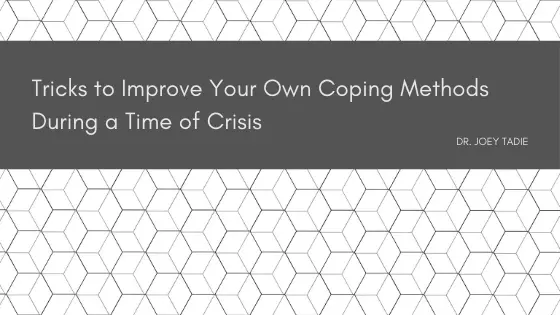Whether we like it or not, the COVID-19 pandemic has inevitably changed many aspects of our daily lives. Many of us are living with stay-at-home orders or are deciding to self-quarantine to help prevent the spread of the virus. This has significantly changed how we work, parent, shop, socialize, or spend free time. Most of us have never had to face such profound or wide-sweeping shifts and we are understandably unprepared for the emotional toll the current restrictions are taking.
I have heard from many individuals both professionally and personally who are experiencing noticeable change to their emotional or mental health. Many people are feeling increased anxiety, fear, and uncertainty about what is happening or going to happen. In addition, people have also expressed hopelessness and even depressive feelings due to prolonged isolation. Interestingly, even those individuals without any prior mental health challenges are now experiencing symptoms for the first time in their lives, and in many cases people don’t know what to do about them. I am here to offer guidance on recognizing emerging mental health symptoms during this complex time, and provide options for addressing these concerns in healthy ways.
Even without any history of anxiety or depression, we are all vulnerable to the fallout from precipitating stressors (i.e. a lot of tough stuff happening at once). We are suddenly facing a virus pandemic that has huge medical, economic, social consequences and this may understandably, create a complex web of stressful layers that are difficult to address with our existing coping strategies. Many of the ways we normally decompress may not be options currently. Maybe the way you cope with stress is by going out with friends for dinner or drinks. Or maybe you like to go skiing or work out at the gym. Perhaps you would prefer to take a vacation, play volleyball in the park, have a playdate with your child’s friend, or simply go to work because it gives you a distraction. Many of the normal, accessible, and even healthy activities we are used to are no longer options. There is potentially a long list of losses that you might be having to endure while the overall atmosphere of your life feels unprecedentedly chaotic and unmoored. What can we do against such enormous headwinds? We can improve our ability to recognize when our distress becomes disruptive and learn the most effective ways to respond for ourselves.

Maybe you notice that you are sleeping more or less than usual, experiencing changes to appetite, feeling less motivated, enjoying things in your life less, experiencing higher levels of tension, or feeling as if you are unable to slow your racing thoughts. When these patterns begin to occur together or if you feel as if any of these feelings are more persistent and are disrupting your life in a noticeable way, it is possible you are experiencing mental health symptoms. It might be beneficial to speak with a doctor or therapist to assess what type of support you might need. Many healthcare professionals, including The Catalyst Center, are offering telemedicine and virtual appointments in order for you to check in about any of the changes you are experiencing. Teletherapy allows you to connect with a therapist at your convenience to get the individualized care needed at this time.
Remember, we are all in an unprecedented time and it is perfectly reasonable to expect some impact to our individual and collective mental health. Whether or not you feel you need professional support, there are some ways you can help manage your mental health during this difficult time. Here are some adaptations of various coping skills to try at home:
- Start a new exercise plan or modify your existing plan that allows you to observe social distancing. Some ideas include walking or running in your neighborhood, doing a virtual workout or yoga session with friends over video chat, or taking part in a push-up challenge (individually or virtually with friends).
- Learn a new skill or activity. There are thousands of free videos online. You can learn how to cook or bake from a professional, learn a woodworking technique, or how to knit or crochet.
- Check out a new podcast. There are also many family friendly options such as Story Pirates, and this can help create opportunities for discussion if these are played in common spaces (e.g. smart speakers such as Alexa).
- Incorporate one quiet activity or mindfulness technique to your daily life. Allow yourself time to read a book, sip coffee while looking at the sunrise, try a guided meditation, or visualize a relaxing or pleasant scene in your mind’s eye while deep breathing. Even allowing yourself five minutes to do any of these types of things can be valuable to your mental wellbeing.
- Create a video chat date with friends, family, or coworkers. Start a virtual happy hour, dinner, book club or game night. Although virtual socializing takes some adjusting, it is certainly better than disconnection or isolation. Let yourself get creative about how you spend virtual time with loved ones and continue to nurture your social needs.
Although we are all up against tremendous challenges, I invite you to consider how to best care for yourself in the most creative ways you can. If you find yourself feeling uninspired, find out what other people are doing to get through this difficult period and let yourself be inspired by their energy and ideas. And if you are needing more support and wonder if teletherapy could be a helpful option for you, reach out to us at, 720.675.7123. We are offering all of our regular services virtually and would be happy to visit with you for a free consultation to determine the best next steps for you. We all need a little help sometimes and in this current climate of uncertainty, a little extra support may help us get through and stay grounded. Take good care!





